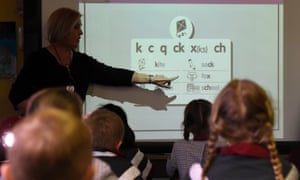Mark Scott echoes state education minister’s criticism, saying more individualised testing will replace Naplan
The head of the New South Wales
education department, Mark Scott, has said Naplan testing will be made
“obsolete” by more sophisticated student assessment methods.
Scott joined NSW education minister Rob Stokes’ recent criticism of the testing regime, telling the ABC on Tuesday that he favoured a shift to smaller, more individualised testing regimes.
“We all know that these smaller tests, these regular ongoing assessments that take place by teachers in classrooms to monitor progress, that this is the way that good assessment happens,” he told the ABC.
“My feeling is that when we prioritise and develop these tools and roll them out, then Naplan will look a little tired, a little simple, a little dated, and so we need to get on with the new reform process.”
The second Gonski report, released at the end of April, advocated for an end to the “industrial model” of mass education, and instead called for more focus on individual learning progress by using diagnostic tools to help teachers identify “dark spots” in students’ learning.
Scott’s said that kind of individualised testing would eventually supersede Naplan.
“I think it will become obsolete because the kinds of information that the new assessment schemes will give us will be richer and deeper and more meaningful for teachers, for parents and for education systems,” he said.
The comments come in the context of increasing criticism of the Naplan testing regime.
Stokes has become a vocal opponent of the test, saying it has been used as a school rating system rather than a measurement of student progress.
“I am all for transparency but this is not transparency – this is actually dishonesty,” he said earlier in May.
The Australian Capital Territory’s education minister, Yvette Berry, said she had similar concerns, believing “that the high-stakes culture around Naplan may be doing more harm than good”.
“In the ACT we see the current school-level reporting on MySchool as contributing to the league table culture and to residualisation and inequity in some schools,” she said.
In April a report commissioned by the New South Wales Teachers Federation by the retired Massachusetts Institute of Technology professor Les Perelman called the test “bizarre” and found that it rewarded students for using big words rather than clear expression.
But Simon Birmingham, the federal education minister, has insisted Naplan testing “serves a very important purpose for many Australian parents”.
“Parents make clear they want to see how their children are progressing, they want to know whether their children are learning the basics of literacy and numeracy that Naplan assesses,” he said earlier this month.
Scott joined NSW education minister Rob Stokes’ recent criticism of the testing regime, telling the ABC on Tuesday that he favoured a shift to smaller, more individualised testing regimes.
“We all know that these smaller tests, these regular ongoing assessments that take place by teachers in classrooms to monitor progress, that this is the way that good assessment happens,” he told the ABC.
“My feeling is that when we prioritise and develop these tools and roll them out, then Naplan will look a little tired, a little simple, a little dated, and so we need to get on with the new reform process.”
The second Gonski report, released at the end of April, advocated for an end to the “industrial model” of mass education, and instead called for more focus on individual learning progress by using diagnostic tools to help teachers identify “dark spots” in students’ learning.
Scott’s said that kind of individualised testing would eventually supersede Naplan.
“I think it will become obsolete because the kinds of information that the new assessment schemes will give us will be richer and deeper and more meaningful for teachers, for parents and for education systems,” he said.
The comments come in the context of increasing criticism of the Naplan testing regime.
Stokes has become a vocal opponent of the test, saying it has been used as a school rating system rather than a measurement of student progress.
“I am all for transparency but this is not transparency – this is actually dishonesty,” he said earlier in May.
The Australian Capital Territory’s education minister, Yvette Berry, said she had similar concerns, believing “that the high-stakes culture around Naplan may be doing more harm than good”.
“In the ACT we see the current school-level reporting on MySchool as contributing to the league table culture and to residualisation and inequity in some schools,” she said.
In April a report commissioned by the New South Wales Teachers Federation by the retired Massachusetts Institute of Technology professor Les Perelman called the test “bizarre” and found that it rewarded students for using big words rather than clear expression.
But Simon Birmingham, the federal education minister, has insisted Naplan testing “serves a very important purpose for many Australian parents”.
“Parents make clear they want to see how their children are progressing, they want to know whether their children are learning the basics of literacy and numeracy that Naplan assesses,” he said earlier this month.

No comments:
Post a Comment